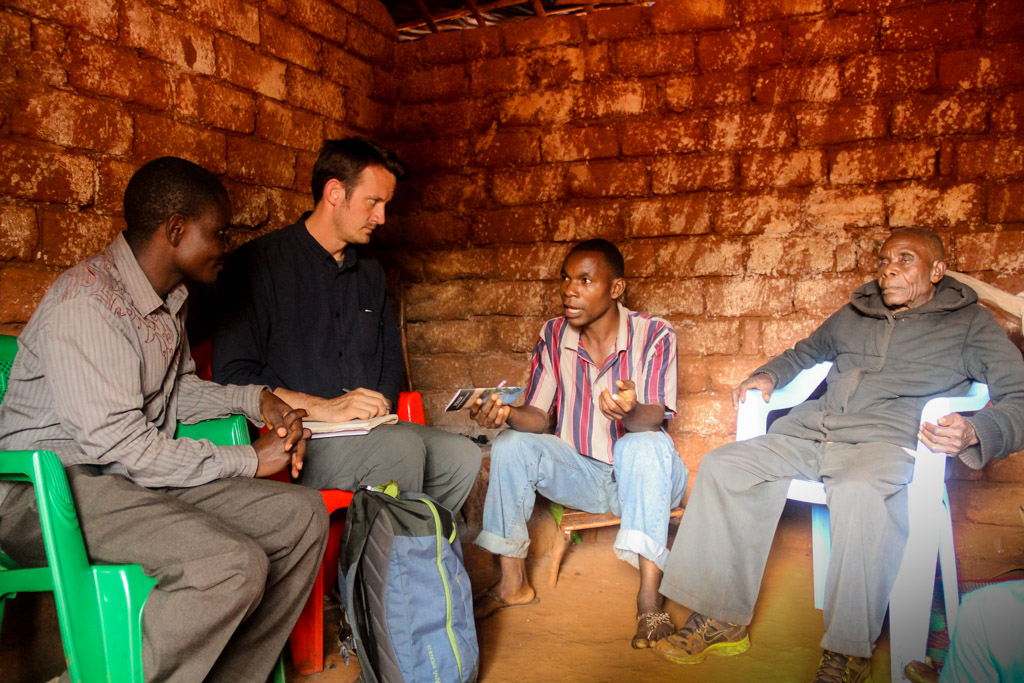IRC: Social Emotional Learning*
Overview
The International Rescue Committee sought design research support to investigate ways of building resiliency amongst students in refugee camps through social emotional learning techniques. The goal statement for the project, which also served as the overlying design principle, was: “Design a flexible and durable learning and teaching experience that dramatically improves a child’s acquisition of Social Emotional Learning (SEL) skills and literacy in their primary school years.”
Role
Kevin was a lead researcher during in-context research activities in Tanzania’s Nyarugusu refugee camp, one of the largest refugee settlements in the world, where he engaged with students and teachers, as well as key community stakeholders, in order to identify and co-create programs that empowered community members to act as mentors and support units to adolescents dealing with significant trauma.
Skills & Activities
User Experience Research and Design
Immersive Field Research
Prototyping
Workshop Facilitation
Rich Media Documentation
Interviewing community members in their home in Nyarugusu refugee camp, Tanzania.
(Photo credit: Quicksand Design Studio)
* - Project done while Kevin was employed with Quicksand Design Studio.
Phase-wise Project Process Map
-
The project kicked off with initial context setting engagements involving secondary research and subject matter expert interviews conducted in order to develop a holistic understanding of the Social Emotional Learning (SEL) industry, as well as to develop a set of emering trends trends in the SEL space. This foundational research informed the development of the research plan, and corresponding discussion guides for in-field interviews, as well as to help frame the overarching challenges and opportunities in the contexts.
-
Kevin and the project team embedded themselves for a week-long immersive field research engagement in the Nyarugusu refugee camp in remote Tanzania, one of the world's largest and most well-known camps that houses over 150,000 refugees largely from Burundi and the Democratic Republic of Congo. There the team met with community leaders, parents, teachers, school administrators, vocational school representatives, religious leaders, and students to ascertain what the educational experiences are like, identify the challenges these stakeholders face, understand what the daily lived realities in a refugee camp are like, and elucidate what latent opportunities exist for incorporating SEL training in order to build resiliency amongst students and other stakeholders. These interviews were complemented by workshops and community visits in order to test and validate the insights gleaned from the stakeholder engagements.
-
Findings from the field research engagements were synthesized and translated into design principles that acted as the basis for a multi-day ideation event with key stakeholders in Dar Es Salaam. Video and audio recordings, along with photographs, from the field research activities were utilized by participants through various proxy research engagements, and stakeholders from the refugee camp joined via video call to contribute their knowledge to the ideation activities as well as to evaluate and provide feedback on emergent concepts for incorporating SEL in camp schools. The most promising concepts were further refined by the project team following the ideation event in preparation for future testing.
-
The concepts were initially vetted by subject matter experts and stakeholders from the refugee communities in order to identify any potential opportunities to improve upon them prior to field testing engagements. Once the concepts were designed to a higher fidelity, the client team re-engaged with stakeholders in-context to train them on how to implement each concept as well as to evaluate their effectiveness.
-
The micro trend analysis, field research report, and emergent concepts, and their accompanying collateral, were all key deliverables from this project. The project team identified critical challenges and opportunities in the refugee context and articulated these in a manner that facilitated a transition from qualitative research insights into program ideation and development. The workshop activities involving staff from the host countries as well as the global headquarters helped to ensure that all voices across the value chain were represented. This paired with the numerous stakeholder engagements allowed for a more holistic and user-centered approach to the ideation activities. Several concepts emerged from the final workshop in Dar es Salaam that the client took forward for refining and developing into new programs. These individual concepts have differing approaches and manifestations, but all essentially seek to improve the quality of the education experience by giving the social emotional aspects of life in refugee camps due consideration, and by capitalizing on the opportunities the project team identified in order to holistically solve a most pressing problem. Engaging students and teachers along the broader community, capitalizing on existing support networks, and incentivizing active participation in the educational process are all key tenets of these core concepts.


